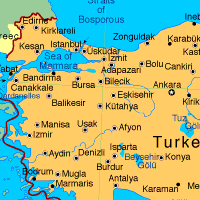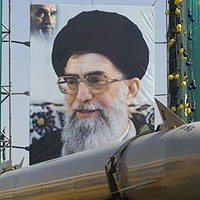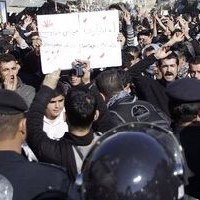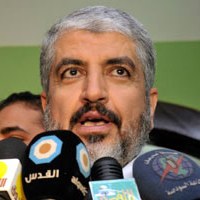![]()
Fri, Nov 18, 2011 | Middle East Forum | by Aymenn Jawad Al-Tamimi
Syria, Turkey and the Kurds
Originally published in the Israel National News.
According to a report by the French daily Le Figaro, Bashar al-Assad is apparently aiming to destabilize Turkey, which has been supporting the predominantly Sunni Islamist leadership of opposition groups to the Syrian regime, by seeking to grant greater autonomy to the Kurdish population that primarily lives in the north and north-east of Syria.
As part of this initiative, Assad has reportedly encouraged the opening of Kurdish schools in the north, and has allowed for a Kurdish politician by the name of Muhammad Salih Muslim — a member of the Democratic Union Party (PYD) that is suspected of being affiliated with the Kurdistan Workers Party (PKK) and is apparently organizing local elections in the Kurdish areas — to return to Syria from exile in Iraq.
What are the observations and conclusions to draw from this report if it is credible?
First, that Assad might wish to use the Kurds as proxies against Turkey in a way has precedent in Syrian policy.
Bashar’s father Hafez had once provided a safe haven for the PKK to launch attacks on Turkish soil, and it was during those years that Turkey, sensing that there was a common terrorist threat in the region, had particularly good ties with Israel. However, in 1998, once Turkey threatened to invade Syria to take out the PKK, Hafez changed course, and the tensions between the two countries slowly began to cool down.
On the other hand, while Hafez was sympathetic to the PKK in so far as he could use the group as a proxy against Turkey, granting any form of autonomy was always out of the question. As Adib Abdulmajid points out, one of the key texts that has traditionally defined the Baathist government’s discriminatory policies against Kurds in Syria is a book entitled ‘A Political, Ethnic, and Social Study of Al-Jazeera Province,’ written by a First Lieutenant in the Syrian Army, Muhammad Talab Hilal.
In his book, Hilal claimed that the Kurds ‘had used the pure religion of Islam for their national goals,’ and argued that they were orchestrating a sinister program of mass immigration into the Al-Jazeera region of the country’s northeast in order to facilitate the creation of a greater Kurdistan. Hence he lambasted the Kurds, calling them ‘rabid dogs’ whose ‘annoying barking’ had to be stopped.
The Syrian regime therefore launched a campaign, after the publication of this book, to carry out a policy of Arabization in Al-Jazeera, similar to Saddam Hussein’s policies in the north of Iraq. Among these Arabization measures included the loss of Syrian citizenship for 400,000 Kurds (a 1962 measure that predated the Assad dynasty by eight years), confiscation of lands for Arab settlers, and the imprisonment, torture and execution of Kurdish activists.
Coming back to the present day, it is plausible that Assad would make concessions to Kurdish demands in order to weaken the opposition, which certainly has some Kurds among its ranks. The Syrian Kurds in general, like those in Iraq, are undoubtedly more concerned with achieving autonomy at the minimum, rather than overthrowing the central government as an end in itself.
Even among Kurds hostile to Assad, there has been a degree of reluctance to work with the opposition coalition known as the Syrian National Council (SNC), which has set up a government-in-exile. This should not be surprising in light of the insistence among many members of the SNC that Syria retain its identity as an ‘Arab Republic’ (‘Syrian Arab Republic’ being the official name for Syria at present).
In addition, as Michael Weiss notes, the Kurds feel under-represented in the Secretariat of the SNC, having only four out of twenty-nine seats, and are concerned about Turkish involvement with the SNC. Thus, it should not come as shock if Assad is trying to exploit these tensions between the Kurds and the SNC.
Nonetheless, if Assad is trying to reach out to Kurds to maintain his hold on power, the initiative of granting greater autonomy could prove a double-edged sword for him. As disclosures from Wikileaks cables reveal, Christians in Al-Jazeera province have claimed that the Kurds have gradually altered the demographics of the area through immigration and high birthrates, such that an alleged 80-90% historic Christian majority is said to have now become a 35% minority.
Owing to these suspicions and fears of Kurdish aspirations in the area, Assad could well see significant numbers of the Christian minority in Syria — comprising around 10% of the population — turn against him should he be granting autonomy to the Kurds in Al-Jazeera province.
But perhaps Assad has decided on balance that the Christians will ultimately refrain from siding with the predominantly Sunni Arab protestors on account of fear of reprisals or discrimination at the hands of a Sunni Islamist regime that might come to power, should the Baathist regime fall.
More generally, the above observations demonstrate that the Kurds are increasingly a force that can no longer just be regarded as sitting on the sidelines.
Iraq is another case in point, where the Kurdish parties now form a key part of the ruling coalition in Baghdad.
Consequently, the Prime Minister Nouri al-Maliki has often been forced to make concessions to the Kurds, such as allowing the Peshmerga (Kurdish militiamen) to move into the disputed territory of Khanaqin district in Diyala province to annex it on the pretext of security issues. When al-Maliki tried to bolster his nationalist credentials by ordering the Kurds in Khanaqin to lower Kurdish flags, demonstrations were staged in response and al-Maliki backed down.
It is noteworthy how the Kurds, deprived of a homeland in spite of being promised self-determination in the aftermath of World War One, are beginning to play the role of kingmakers in the two countries that have been ruled by Baathist governments (in Iraq this rule lasted from 1968 until the U.S.-led invasion in 2003).
Indeed, despite Baathism’s claims to uphold pan-Arab nationalism, the ideology has been little more than a façade for minority despotism: Alawite in the case of Syria, Sunni Arab in the case of Iraq.
Aymenn Jawad Al-Tamimi is a student at Brasenose College, Oxford University, and an intern at the Middle East Forum.



 RSS
RSS











Syria, Turkey and the Kurds | Middle East, Israel, Arab World, Southwest Asia, Maghreb http://t.co/9KRali0g
Syria, Turkey and the Kurds – http://t.co/aZreuvMu
Syria, Turkey and the Kurds | Middle East, Israel, Arab World, Southwest Asia, Maghreb http://t.co/9KRali0g
[…] of the Sunni Arabs in the SNC and their ties to Turkey. Assad has attempted to exploit this by trying to reach out to the Kurds in the country’s […]